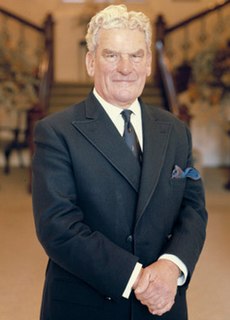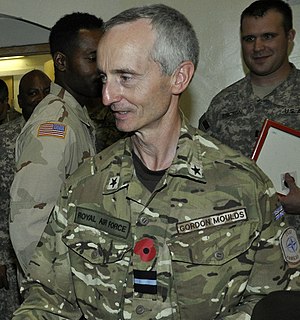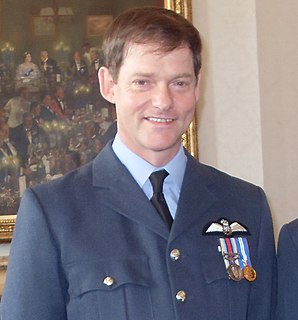
The Air Training Corps (ATC) is a British volunteer-military youth organisation. They are sponsored by the Ministry of Defence and the Royal Air Force. The majority of staff are volunteers, and some are paid for full-time work – including Commandant Air Cadets, a Full Term Reserve Service RAF officer, at the rank of Air Commodore. Although many ATC cadets go on to join the RAF or other services, the ATC is not a recruiting organisation for its parent service.

Air Chief Marshal Sir Wallace Hart Kyle, was an Australian who served in the Royal Air Force (RAF) as a senior commander and later as the 24th Governor of Western Australia. Born in Kalgoorlie, Western Australia, Kyle was commissioned into the RAF in 1929, and, having seen service in the Second World War and the Malayan Emergency, held a number of senior positions, including Vice-Chief of the Air Staff and commander-in-chief of the RAF's Bomber Command and Strike Command. He was made Governor of Western Australia in 1975, a position in which he served until 1980, later returning to England, where he died in 1988.

Air Chief Marshal Percy Ronald Gardner Bernard, 5th Earl of Bandon, was an Anglo-Irish aristocrat who served as a senior commander in the Royal Air Force in the mid-20th century. He was a squadron, station and group commander during the Second World War, and the fifth Commandant of the Royal Observer Corps after the war. He was awarded the American Distinguished Flying Cross and Bronze Star Medal in 1946.
Air Commodore Jon Chitty, OBE RAF, was Commandant of the Air Training Corps (ATC) from 3 May 2002 until July 2005.

Air Commodore Gordon Moulds, CBE DL is a retired Senior Royal Air Force Officer who held various commands including most recently Commander of Kandahar Airfield in Afghanistan.

Air Vice Marshal Meredith Thomas, was a senior commander in the Royal Air Force during the Second World War. He began his career as a flying ace during the First World War, credited with five aerial victories.

Air Commodore Ian Richard William Stewart is a retired British Royal Air Force officer. His last posting was as the United Kingdom National Military Representative at Supreme Headquarters Allied Powers Europe. He was Commandant Air Cadets between 2008 and 2010, and Air Commodore, Royal Air Force Reserve from 2014.
Air Marshal Clifford Rodney Spink, is a retired senior Royal Air Force officer, who is now a Spitfire display pilot on the national air display circuit. The first Spitfire he ever flew belonged to the Battle of Britain Memorial Flight, during his tenure as Station Commander of RAF Coningsby. He also served as the 23rd Commandant of the Royal Observer Corps, the last but one officer to hold the post.

Air Marshal Sir Richard Bowen Jordan, was a bomber pilot and squadron commander during the Second World War, a senior Royal Air Force officer during the post-war years and the sixth Commandant of the Royal Observer Corps (1949–51).

Air Marshal Sir Leonard Horatio Slatter, was a naval aviator during the First World War and a senior Royal Air Force commander during the Second World War. Slatter ended his career as the Air Officer Commanding-in-Chief of Coastal Command.
Air Commodore Gordon Herbert Vasse, was a fighter pilot in the First World War and a senior Royal Air Force commander during the Second World War and into the early 1950s. During most of the Second World War he was Director of Air Tactics for the RAF.
Air Vice Marshal John Frederick George Howe, was a senior Royal Air Force officer in the 1970s and 1980s. He flew combat missions in the Korean War and North Sea interceptor air patrols during the Cold War, finishing his career as the Commandant General RAF Regiment and RAF Provost Marshal and Director General Security. Howe also served as the sixteenth Commandant of the Royal Observer Corps between 1977 and 1980.
Air Commodore John Herbert Thomas Simpson, was a bomber pilot during the Second World War and a senior Royal Air Force (RAF) staff officer during the 1950s. In his final appointment before retirement in 1959, Simpson was the eighth Commandant of the Royal Observer Corps.
Air Commodore John "Johnnie" Mortimer Warfield CBE RAF was a bomber pilot during the Second World War, a senior RAF staff officer and commander during the Malayan Emergency in the 1950s and, as an Air Commodore in his final tour, the ninth Commandant of the Royal Observer Corps.
Air Commodore Cathcart Michael Wight-Boycott, was a British fighter pilot during the Second World War and a senior Royal Air Force officer during the post-war years. In 1961, Wight-Boycott became the 10th Commandant Royal Observer Corps.
Air Commodore Raymond John Offord, AFC was a senior Royal Air Force officer in the Cold War period, and the seventeenth Commandant Royal Observer Corps. Offord was Station Commander of RAF Lossiemouth from 1974 to 1975 and held the dual appointments of Air Officer Commanding Air Headquarters Cyprus and Deputy Commander, British Forces Near East / Cyprus from 1983 to 1985.
Air Commodore Martin Keith Widdowson was a senior Royal Air Force officer in the 1980s and 1990s and the 24th and last Commandant Royal Observer Corps.
Air Commodore Timothy Gane Thorn,, often known as Tim Thorn and nicknamed "Tiger", is a retired Royal Air Force officer and up to January 2010 was a pilot and flying instructor at 6 Air Experience Flight at RAF Benson, Oxfordshire.
Air Marshal Sir Leslie Dalton Morris, was a senior Royal Air Force (RAF) commander in the middle of the twentieth century. He played a leading role in the use of signals in the Air Force both during and after the Second World War.
Air Vice Marshal Peter John Harding, was a senior Royal Air Force officer who served as Defence Services Secretary from 1994 to 1998.







